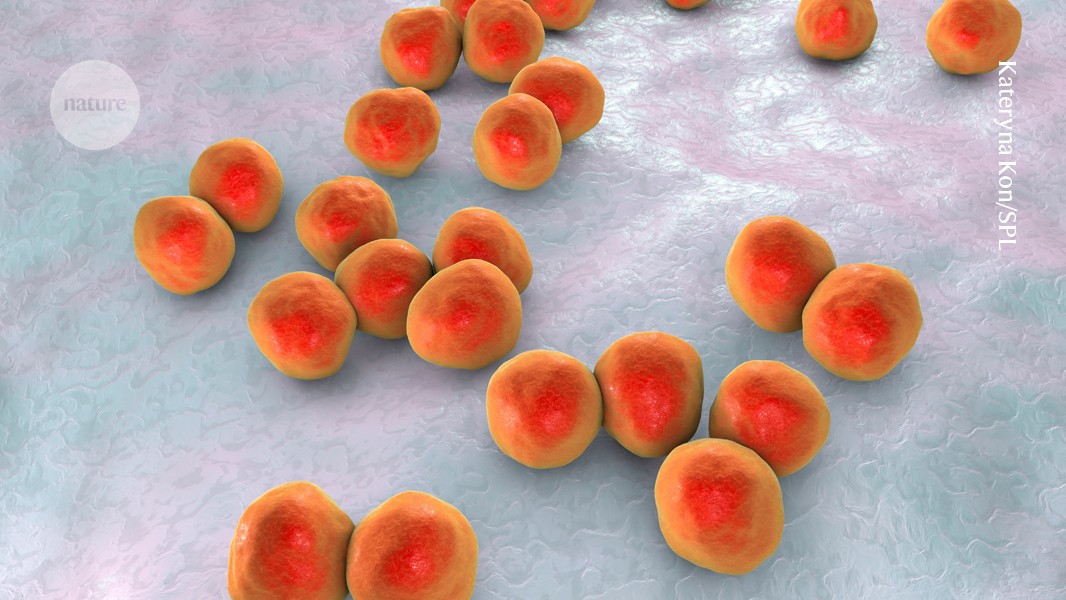Thank you for visiting nature.com. You are using a browser version with limited support for CSS. To obtain the best experience, we recommend you use a more up to date browser (or turn off compatibility mode in Internet Explorer). In the meantime, to ensure continued support, we are displaying the site without styles and JavaScript.
Advertisement
Giorgia Guglielmi is a science journalist in Basel, Switzerland.
You can also search for this author in PubMed Google Scholar
A bacterial grouping that includes the genus Veillonella (artificially coloured) has been linked to a lower rate of response to cancer immunotherapy. Credit: Kateryna Kon/Science Photo Library
Despite their small size, gut bacteria wield large influence over the effectiveness of certain cancer drugs. Researchers have now found that the ratio of specific microbial communities in the gut can help to predict who will respond to next-generation drugs for treating some kinds of cancer1.
The findings will also help to identify healthy volunteers who could donate faecal bacteria to transfer into the intestines of people who do not respond to these drugs, a procedure known as faecal microbiome transplantation, study co-author Laurence Zitvogel, an immunologist and oncologist at the Gustave Roussy Cancer Campus in Villejuif, France, wrote in an e-mail to Nature.
The work “is a breakthrough from a diagnostic point of view”, says Fabio Grassi, an immunologist at the Institute for Research in Biomedicine in Bellinzona, Switzerland. The findings, he says, also highlight how the delicate balance of gut microbial species can affect the success of high-stakes therapies, such as immune checkpoint inhibitors. This treatment helps the immune system to recognize and attack cancer cells and is the focus of the new research. The findings were published today in Cell.
Over the past decade, Zitvogel and others have investigated how gut microbes interact with these cancer treatments in ways that activate the immune system. “Everyone was looking for that single bug that [could] improve response to immunotherapy across cancer types — and it was elusive,” says Jennifer Wargo, a physician-scientist at the University of Texas MD Anderson Cancer Center in Houston. In 2018, Wargo published a study2 — alongside similar ones by Zitvogel3 and a third team4 — that linked specific gut bacteria to positive clinical outcomes following immunotherapy treatment in mice and people with cancer. But there was little agreement on which microbial species were associated with treatment response.
Wargo says that Zitvogel’s latest research helps to answer why the search for a single gut microbe that could boost responses to cancer immunotherapy was so challenging. Instead of focusing on individual microbial species, the work shows that the overall make-up of microbial communities in the gut influences a person’s response. “It’s all about the community structure,” Wargo says.

Why are so many young people getting cancer? What the data say
Why are so many young people getting cancer? What the data say
Zitvogel and her colleagues analysed faecal samples from 245 people with lung cancer and identified two groups of microbial species: group one contained 37 microbes, such as Veillonella species, that are linked to resistance to immune checkpoint inhibitors; group two included 45 bacterial species associated with positive responses. People with lung cancer with response-associated bacteria lived longer than did those with resistance-associated bacteria.
Next, the researchers developed a person-specific score based on the ratio between group one and group two. The score also included quantification of Akkermansia muciniphila, a microbe that has gained attention owing to its potential role in influencing immune responses.
When tested on hundreds of people with various types of cancer, including kidney cancer, the score could predict in most cases who was likely to respond to treatment with immune checkpoint inhibitors. The score will soon be transformed into a diagnostic assay, Zitvogel wrote.
The tool could help to identify people with cancer who might need microbiome-targeting therapies to boost their response to immunotherapy, but it requires further validation before it can be used in the clinic, says Francesca Gazzaniga, a biologist at Massachusetts General Hospital in Boston.
She also notes that the study focused on participants in Canada and France, so the score might not be as predictive in populations living in different areas and eating different diets, Gazzaniga says. “This is a good start, and if we understand more about the underlying mechanisms — why these sets of bacteria are important — we might be able to get better targeted therapies.”
Research on the role of microbiota in the response to immunotherapy began years ago, yet there have been no tangible benefits for patients so far, says Maria Rescigno, an immunologist at Humanitas University in Milan, Italy. All the same, Rescigno anticipates that doctors will integrate the tool developed by Zitvogel and her team into practice. “If clinicians adopt this, it could lead to a significant change for the patients.”
doi: https://doi.org/10.1038/d41586-024-02070-9
Derosa, L. et al. Cell https://doi.org/10.1016/j.cell.2024.05.029 (2024).
Article Google Scholar
Gopalakrishnan, V. et al. Science 359, 97–103 (2018).
Article PubMed Google Scholar
Routy, B. et al. Science 359, 91–97 (2018).
Article PubMed Google Scholar
Matson, V. et al. Science 359, 104–108 (2018).
Article PubMed Google Scholar
Download references
Reprints and permissions
 Ovarian cancer and the microbiome: a complex relationship
Ovarian cancer and the microbiome: a complex relationship
 Highlights from studies on the gut microbiome
Highlights from studies on the gut microbiome
 How our microbiome is shaped by family, friends and even neighbours
How our microbiome is shaped by family, friends and even neighbours
 How gut microbes are joining the fight against cancer
How gut microbes are joining the fight against cancer
CRISPR cures and cancer vaccines: researchers can help to shepherd them to market
Editorial
DNA mismatch and damage patterns revealed by single-molecule sequencing
Article
Strand-resolved mutagenicity of DNA damage and repair
Article
Sex hormones in the gut soar during pregnancy — thanks to busy bacteria
Research Highlight
A Gram-negative-selective antibiotic that spares the gut microbiome
Article
Gut microbes linked to fatty diet drive tumour growth
News
Could rats and dogs detect disease better than the finest lab equipment?
Outlook
Human neuroscience is entering a new era — it mustn’t forget its human dimension
Editorial
First encounter with SARS-CoV-2: immune portraits of COVID susceptibility
News & Views
The wide-ranging expertise drawing from technical, engineering or science professions…
Shenzhen,China
Shenzhen Institute of Synthetic Biology
Call for top experts and scholars in the field of science and technology.
Shenyang, Liaoning, China
Shengjing Hospital of China Medical University
We aim to foster cutting-edge scientific and technological advancements in the field of molecular tissue biology at the single-cell level.
Guangzhou, Guangdong, China
Guangzhou Institutes of Biomedicine and Health(GIBH), Chinese Academy of Sciences
Dallas, Texas (US)
The University of Texas Southwestern Medical Center (UT Southwestern Medical Center)
Postdoc positions on ERC projects – cellular stress responses, proteostasis and autophagy
Frankfurt am Main, Hessen (DE)
Goethe University (GU) Frankfurt am Main – Institute of Molecular Systems Medicine
You have full access to this article via your institution.
 Ovarian cancer and the microbiome: a complex relationship
Ovarian cancer and the microbiome: a complex relationship
 Highlights from studies on the gut microbiome
Highlights from studies on the gut microbiome
 How our microbiome is shaped by family, friends and even neighbours
How our microbiome is shaped by family, friends and even neighbours
 How gut microbes are joining the fight against cancer
How gut microbes are joining the fight against cancer
An essential round-up of science news, opinion and analysis, delivered to your inbox every weekday.
Sign up for the Nature Briefing newsletter — what matters in science, free to your inbox daily.
© 2024 Springer Nature Limited
